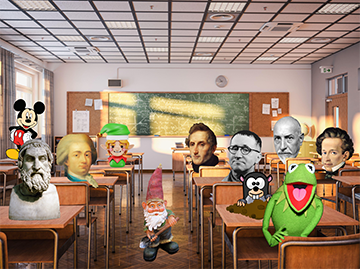Eighteen actors tell of the rise to power of Mussolini in thirty scenes, from the founding of the Fasci di Combattimento (the fighting bands), to the March on Rome and the speech in parliament on 3 January 1925, and to the spreading of Squadrismo. Through theatre, Massimo Popolizio examines the six years that shook Italy.
-
Teatro Strehler
An adaptation in thirty scenes of the historical novel by Antonio Scurati, M, the theatrical piece has a circular structure, opening with the final line of the book and returning to that same fateful phrase spoken in parliament by Mussolini at the moment of assuming power: If Fascism has been a criminal association... the responsibility is mine.
Without offering a concentration of historical facts, the theatrical piece seeks to stage a plastic and expressionist representation of the rise of Fascism.
“It is a play of words - explains Massimo Popolizio - a relay between eighteen actors who, freed of all rhetoric, bring to the attention of the audience the relentless rhythm of a rise to power that took place in a moment of profound weakness among institutions and political parties”.
It is a story that can never be too well-understood, in particular the six-year period that followed the Great War, with the Fiume Enterprise, the country’s faltering steps towards the socialist revolution, the reaction and spread of Squadrismo, the daring March on Rome (for which October 2022 marks the centenary) and the relentless efficiency of a political doctrine that used violence to avoid the constraints of justice.
The leading figures are the founder of Fascism and his deputies, who we hear expressed in third and first person; Marinetti, D’Annunzio, Margherita Sarfatti, the antagonists Nicola Bombacci, Pietro Nenni and Giacomo Matteotti (also examined through the moving epistolary relationship with his wife Velia), Italo Balbo, the disbanded soldiers of the Great War and an entire mass of individuals who rose the ranks. The central figure is the entire national community, the “opaque country”, almost as though Fascism were not “the carrier of this spreading virus but rather the virus itself”.
Duration: 180' with interval
An adaptation in thirty scenes of the historical novel by Antonio Scurati, M, the theatrical piece has a circular structure, opening with the final line of the book and returning to that same fateful phrase spoken in parliament by Mussolini at the moment of assuming power: If Fascism has been a criminal association... the responsibility is mine.
Without offering a concentration of historical facts, the theatrical piece seeks to stage a plastic and expressionist representation of the rise of Fascism.
“It is a play of words - explains Massimo Popolizio - a relay between eighteen actors who, freed of all rhetoric, bring to the attention of the audience the relentless rhythm of a rise to power that took place in a moment of profound weakness among institutions and political parties”.
It is a story that can never be too well-understood, in particular the six-year period that followed the Great War, with the Fiume Enterprise, the country’s faltering steps towards the socialist revolution, the reaction and spread of Squadrismo, the daring March on Rome (for which October 2022 marks the centenary) and the relentless efficiency of a political doctrine that used violence to avoid the constraints of justice.
The leading figures are the founder of Fascism and his deputies, who we hear expressed in third and first person; Marinetti, D’Annunzio, Margherita Sarfatti, the antagonists Nicola Bombacci, Pietro Nenni and Giacomo Matteotti (also examined through the moving epistolary relationship with his wife Velia), Italo Balbo, the disbanded soldiers of the Great War and an entire mass of individuals who rose the ranks. The central figure is the entire national community, the “opaque country”, almost as though Fascism were not “the carrier of this spreading virus but rather the virus itself”.
Duration: 180' with interval
Meetings and insights
Credits
M Il figlio del secolo
a play by Massimo Popolizio
based on the novel by Antonio Scurati
dramaturgy collaborator Lorenzo Pavolini
directed by Massimo Popolizio
sets Marco Rossi
costumes Gianluca Sbicca
lighting Luigi Biondi
video Riccardo Frati
sound Alessandro Saviozzi
with Massimo Popolizio and Tommaso Ragno
and with (in alphabetical order) Riccardo Bocci, Gabriele Brunelli, Tommaso Cardarelli, Michele Dell’Utri, Giulia Di Renzi, Raffaele Esposito, Flavio Francucci, Francesco Giordano, Diana Manea, Paolo Musio, Michele Nani, Alberto Onofrietti, Francesca Osso, Antonio Perretta, Sandra Toffolatti, Beatrice Verzotti
a Piccolo Teatro di Milano-Teatro d’Europa, Teatro di Roma, luce Cinecittà production
in collaboration with Centro Teatrale Santacristina
Tickets
Category of performance Piccolo Production
Stalls full price € 40 | Discounted (under 26 and over 65) € 23
Balcony full price € 32 | Discounted (Under 26 and over 65) € 20
Subscriptions
The performance is available for subscription holders.
To purchase a subscription online, click here.
How and where to purchase
For information, click here.
COVID-19
Read the guidelines for access to the activities.
Organised groups and audiences
For information on tickets for organised groups:
tel. 02 72 333 216
email promozione.pubblico@piccoloteatromilano.it































